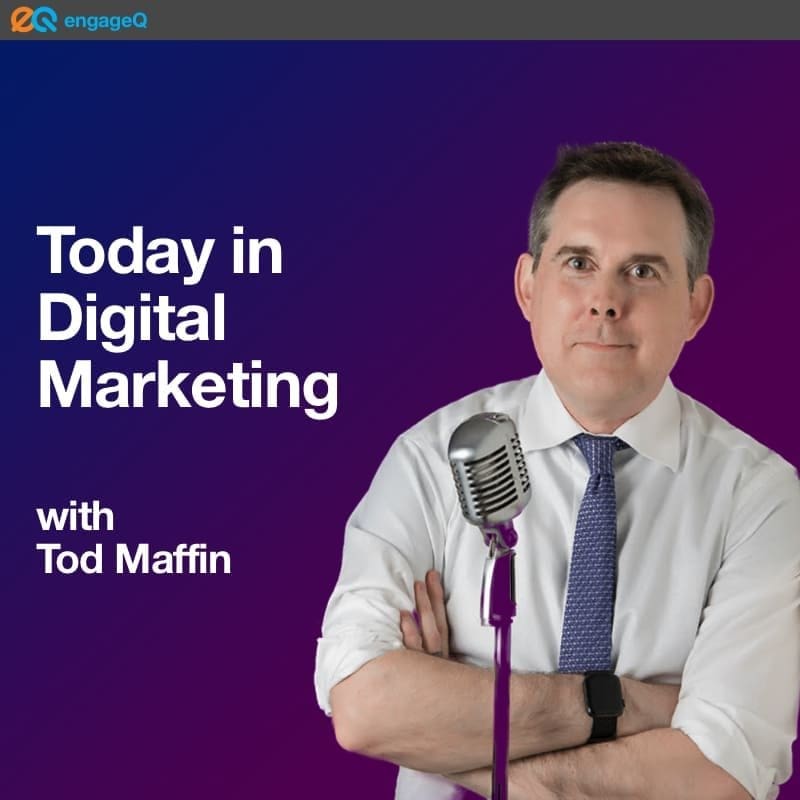In 2018, Spotify had an interesting marketing campaign. It offered its users the ability to upload their genetic data, which Spotify would then turn into custom playlists that matched their genetic ancestry.
A few months later, Mexico’s national air carrier, Aeromexico, launched a DNA discounts program offering discounted flights to the country. The more Mexican you were, genetically speaking, the more of a discount you’d get.
Welcome to the new world of genetic marketing: One where we might soon see genetic predisposition listed in Facebook’s Ads Manager as a targeting criteria.
It’s a topic Remi Deviat studied. He’s an assistant professor of marketing at the Wisconsin School of Business. He and his colleagues recently published a paper called Genetic Data: Potential Uses and Misuses in Marketing.
He spoke recently to our podcast host Tod Maffin.
Table of Contents
- The Ultimate First-Party Data
- Genetics Can Determine Your Taste
- Could This Genetics Us Uncover New Prospects?
- Could Genetics Aid Market Research?
- Will We See “Genetic Predisposition” as an Ads Targeting Option?
- The Lack of Ethical Guidelines
- Video Presentation
The Ultimate First-Party Data
Tod Maffin: First, how does this work logistically? Someone buys a consumer testing kit, then they upload the results to a social media platform?
Prof. Daviet: They buy a testing kit, which is usually just a plastic tube that you fill with spit, and then you seal the tube and ship it. Once the tube is shipped, it’s analyzed by a lab and the data is released to your providers, 23andMe or ancestry.com, and then you have this data available to both you and your provider.
Tod Maffin: What’s been to your understanding of consumer’s comfort level with that?
Prof. Daviet: So far, I think the consumers are mostly uneducated. They might see it just as some data about themselves, like their shop behavior online or their purchase, whether it’s online or offline. They don’t necessarily understand that once a company has their genetic data, they have some things that’s informative about virtually everything in their lives, like their educational attainment, what they like to eat, at what time they wake up, or all the things can be partially inferred from DNA.
When you send your DNA to say, “Am I tasting soup when I eat cilantro?” You don’t necessarily know that this DNA can be used to answer a lot of other questions that could be used for marketing purposes.
Genetics Can Determine Your Taste
Tod Maffin: Like what?
Prof. Daviet: Taste is one of these. Like I mentioned, cilantro. Like 23andMe will tell you if you prefer vanilla or chocolate. We ran actually a study on general taste of food and we can see that virtually, all tastes so spicy salty, savory. They can be the preferences regarding these tastes can be partially predicted by a genetic code, but you also have everything related to your circuit in rhythm. As I mentioned, if you wake up early, if you like to do sports, if you study a lot, if you are more of an outdoor person, if you like gathering, or if you prefer to stay by yourself, I can go on forever because almost any behavior, we have data on.
We could predict it, to some extent, with genetic data and usually, the r2. The percentage of variation that we can explain based on the DNA for behaviors is between 15% and 25% for all of them, but that requires very large samples. It’s not easy to run these studies, and big companies that have 30 million customers can do that. For us scientists, it’s a bit harder.
Tod Maffin: The timing of your study, I thought was really interesting because we, marketers, are in a time and space right now where partially because of privacy, partially because of legislation, we are getting fewer and fewer targeting abilities. Facebook, just this week, removed a whole bunch of targeting abilities. Are these genetic predictive estimates good enough to predict that someone might be predisposed to purchase a specific product? Could a coffee shop, for instance, use genetic data to target consumers who have a genetic potential to like espresso?
Prof. Daviet: Coffee shop is a specific case because there is a very specific genetic variation that change your sensitivity to bitterness. For coffee, we might have better actually predictive abilities and other traits that rely on thousands of variations. For most behavior, DNA by itself is not predictive enough to do individualized targeting. It could be good for populations, but not for individuals. When we are in others to this where we added demographic data or behavioral data, we found that a prediction that could be already good based on demographics and past behavior will be even better adding genetics. Once you combine all these data sets, that’s when you have a really good targeting accuracy.
Tod Maffin: Layering it as an additional layer on top of it to tweak it.
Prof. Daviet: Yes.
Could This Genetics Us Uncover New Prospects?
Tod Maffin: Since genetic information is somewhat, as I understand it, at least shared between family members, could marketers use this to find out who else in the household might want to buy a specific thing?
Prof. Daviet: Yes. Technically, I did a test and they have 50% of my mom’s DNA with my data. If they found out that I was lactose-intolerant, they could actually try to target my mom with soy milk or almond milk or alternative dairy product. The problem here that we’re facing is not really technical, it’s more ethical. My mother never consented to give her DNA to have it mine. Actually, she’s in Europe so she’s protected by GDPR on that regard, but in the US, there is no protection regarding family members.
Actually, this data has been mine, not necessarily for marketing, but to find the golden state killer. t was found through relatives who shared their DNA on ancestry platforms. They could say, “Oh, this killer we’re looking for is a member of that family, that family, and that family.” By triangulating, they found who it was so this is completely possible.
Could Genetics Aid Market Research?
Tod Maffin: How could this affect market research? In your paper that our current methods have got flaws, basically, when it comes to some topics, like flaws in terms of the scientific method, studying the relationship between someone’s consumption habits and their long-term happiness because the proper scientific method would require us to put one set of subjects into a group where we might, I don’t know, reduce the nutritional value of their food, which obviously would create a threat to their health. Can genetics play a role in filling some of that market research gap?
Prof. Daviet: For causality, I think the biggest potential of genetic data for marketing is based on correlation, so just predicting you are a member of this group, you’re more likely to have these habits. We are not sure if it’s caused by the genes or if the genes are just informative about it. However, there is this very specific characteristic of genetic data that you are born with it and whatever you do in your life, it won’t change until we have genetic kits to modify your DNA available, but it’s not authorized by the FDA right now.
Since DNA is mutable, and it’s random because if you know your parents’ DNA, you got randomly 50% of your mom’s DNA randomly, 50% of your biological dad’s DNA. Once we know that, we have a natural experiment, basically, that gives you both the randomness and the independence on the side of the DNA. You can use this as an instrumental variable or if you are in quantitative genetics, I call this Mendelian randomization, to find the causal effect of DNA on some behavior. For research that’s looking at causality, it’s possible to use DNA, and DNA is actually a very good candidate due to this characteristic of not being modified by external factors like other variables. The causal direction is very clear.
Will We See “Genetic Predisposition” as an Ads Targeting Option?
Tod Maffin: Right now, when marketers go to place in advertisement on say, Facebook, we get presented a list of targeting options. One of them is interests. For instance, are they interested in coffee? Are they interested in sports? Do you think that 5 years, 20 years, 1 year from now, we will see a marker for genetics or that can be a targeting option as well?
Prof. Daviet: If you’re looking at 23andMe, specifically, they mentioned already that their goal is not necessarily to make money by selling kits. Their goal is to become the Google of personalized healthcare. In the specific market of healthcare, they do intend to monetize the data. That’s likely by offering you suggestions about what product you could use to improve your health, to prevent some future potential disease, and this kind of thing.
They could actually target you with this kind of data, either through their own platform or by selling or sharing a mailing list with Facebook and say, “We know you have these people on Facebook, and we would like to send them this ad about hair loss product because they’re more likely to lose their hair as they reach 35, 40.”
The Lack of Ethical Guidelines
Tod Maffin: What surprised you the most about your research, Professor?
Prof. Daviet: Oh, [chuckles] the first surprise is how few ethical guidelines there are for businesses. Another surprise was how informative DNA was. This is why we require more ethical guidelines and maybe regulations. You have something you’re born with that can predict your life 60 year ahead since you’re born. Of course, it’s a very noisy signal, but it can still have some predictive ability. When I’m born, you might have some companies saying, “Oh, when this person turns 18, they are more likely to like coffee.” Give me another variable that can predict this so far ahead.
Imagine companies starting to target specific consumer when they are 13 or 14 because they know that when they turn 18, they might develop some attraction to a specific kind of product. This is fascinating because it’s kind of a unique data. I did not expect it to have actually so much potential for marketing.
Tod Maffin: Do you think this discovery or this adaptation of this data is generally good for society, generally bad for society?
Prof. Daviet: It has a lot of good potential, but given the current climate of absence of regulation and some firms who show no concern toward ethics or moral, I’m a bit worried, actually. I’m less worried in Europe where it’s strongly regulated, but in the rest of the world, it’s very uncertain where we are going to, I think.
Tod Maffin: Well, it’s fascinating and scary, [chuckles] all at the same time.














